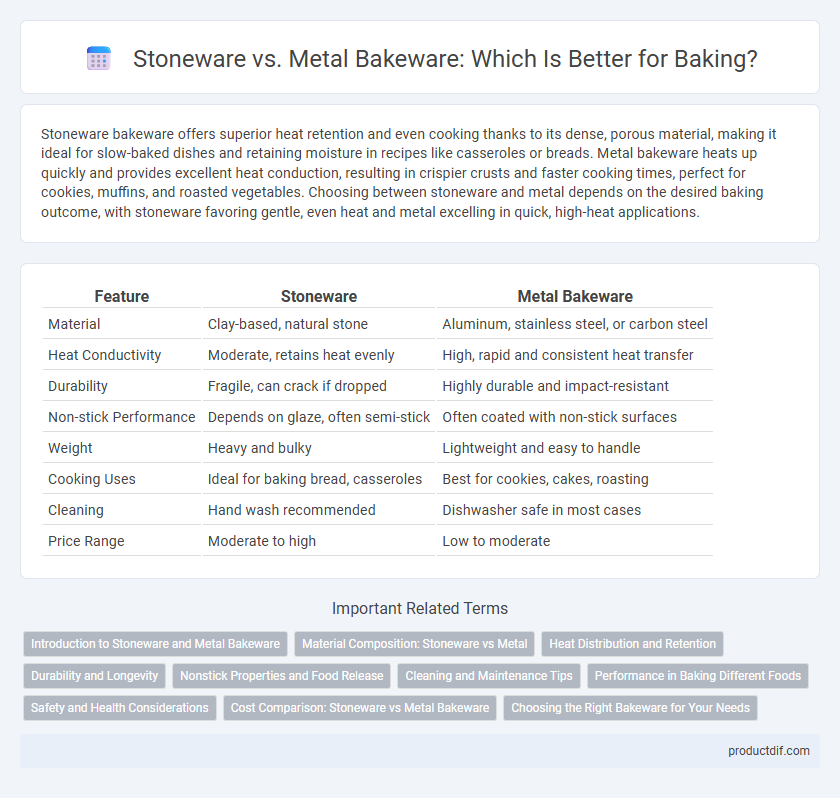Stoneware bakeware offers superior heat retention and even cooking thanks to its dense, porous material, making it ideal for slow-baked dishes and retaining moisture in recipes like casseroles or breads. Metal bakeware heats up quickly and provides excellent heat conduction, resulting in crispier crusts and faster cooking times, perfect for cookies, muffins, and roasted vegetables. Choosing between stoneware and metal depends on the desired baking outcome, with stoneware favoring gentle, even heat and metal excelling in quick, high-heat applications.
Table of Comparison
| Feature | Stoneware | Metal Bakeware |
|---|---|---|
| Material | Clay-based, natural stone | Aluminum, stainless steel, or carbon steel |
| Heat Conductivity | Moderate, retains heat evenly | High, rapid and consistent heat transfer |
| Durability | Fragile, can crack if dropped | Highly durable and impact-resistant |
| Non-stick Performance | Depends on glaze, often semi-stick | Often coated with non-stick surfaces |
| Weight | Heavy and bulky | Lightweight and easy to handle |
| Cooking Uses | Ideal for baking bread, casseroles | Best for cookies, cakes, roasting |
| Cleaning | Hand wash recommended | Dishwasher safe in most cases |
| Price Range | Moderate to high | Low to moderate |
Introduction to Stoneware and Metal Bakeware
Stoneware bakeware is made from dense, oven-fired clay, offering excellent heat retention and even cooking, ideal for baking breads, casseroles, and desserts. Metal bakeware, typically aluminum or stainless steel, heats quickly and provides a reliable non-stick surface, favored for cookies, cakes, and roasting vegetables. Both materials vary in heat conduction and durability, influencing cooking results and maintenance requirements in the kitchen.
Material Composition: Stoneware vs Metal
Stoneware bakeware is made from natural clay that is fired at high temperatures, creating a dense, non-porous ceramic material known for excellent heat retention and even baking. Metal bakeware, commonly crafted from aluminum, stainless steel, or carbon steel, offers superior heat conductivity and faster heating times, which can affect browning and crisping. The material composition directly influences the baking performance, with stoneware providing gentle, consistent heat and metal enabling quick temperature response.
Heat Distribution and Retention
Stoneware offers superior heat retention, maintaining consistent oven temperatures longer than metal bakeware, which results in evenly baked goods with a golden crust. Metal bakeware, particularly aluminum and stainless steel, excels in rapid heat distribution, allowing for quick temperature changes and precise baking control. Choosing between stoneware and metal depends on the baking task: stoneware is ideal for slow, even cooking, while metal performs best for recipes requiring fast heat adjustments.
Durability and Longevity
Stoneware offers exceptional durability due to its resistance to chipping, cracking, and scratching, maintaining its integrity over many years of use. Metal bakeware, typically made from aluminum or stainless steel, tends to be more susceptible to warping and surface damage but excels in fast, even heat conduction for baking performance. When prioritizing longevity, stoneware generally provides a longer-lasting, resilient option ideal for frequent use and consistent baking results.
Nonstick Properties and Food Release
Stoneware offers natural nonstick properties due to its porous surface, which absorbs oil and moisture, enhancing food release without the need for synthetic coatings. Metal bakeware, especially when coated with nonstick finishes such as PTFE or ceramic, provides excellent food release but may degrade over time and require careful maintenance. Both materials vary in heat conduction, with metal heating faster and stoneware distributing heat more evenly, affecting the consistency of baked goods.
Cleaning and Maintenance Tips
Stoneware bakeware requires gentle cleaning with non-abrasive sponges and mild dish soap to prevent surface damage and maintain its natural non-stick properties. Metal bakeware benefits from thorough drying after washing to avoid rust and may need occasional seasoning with oil for carbon steel types to preserve its coating. Avoid harsh detergents and dishwasher use for both types to extend their lifespan and keep them performing optimally.
Performance in Baking Different Foods
Stoneware provides even heat distribution and excels in baking breads and casseroles, producing a moist, tender crumb due to its porous nature. Metal bakeware heats rapidly and offers superior browning and crisping, making it ideal for cookies, roasting, and quick-bake recipes. Choosing between stoneware and metal depends on desired texture and cooking speed for specific baked goods.
Safety and Health Considerations
Stoneware bakeware, made from natural clay fired at high temperatures, is non-toxic, free from harmful chemicals, and provides even heat distribution, reducing the risk of hot spots that can cause burns. Metal bakeware, typically aluminum or stainless steel, heats quickly and is durable, but aluminum may leach into food when cooked at high temperatures, raising health concerns. For safer cooking, stoneware is preferred due to its chemical inertness and resistance to reactive metals, minimizing potential health risks associated with metal bakeware.
Cost Comparison: Stoneware vs Metal Bakeware
Stoneware bakeware typically ranges from $20 to $60 per piece, offering durability and heat retention but often at a higher initial cost than metal alternatives. Metal bakeware, such as aluminum or stainless steel, generally costs between $10 and $40, providing affordability and faster heat conduction ideal for even baking. Long-term value may favor stoneware due to its resistance to warping and non-reactive surface, while metal bakeware may require replacement more frequently under heavy use.
Choosing the Right Bakeware for Your Needs
Stoneware offers excellent heat retention and even baking, making it ideal for casseroles and bread, while metal bakeware heats quickly and provides superior browning, perfect for cookies and pastries. Consider durability and maintenance; stoneware is more fragile but non-reactive, whereas metal is more versatile and often dishwasher safe. Select bakeware based on your cooking style and recipe requirements to optimize baking results and longevity.
Stoneware vs Metal Bakeware Infographic

 productdif.com
productdif.com